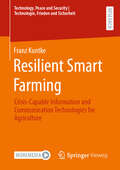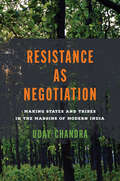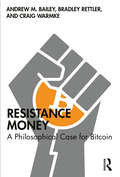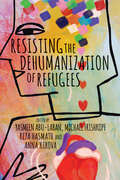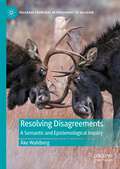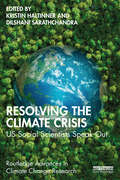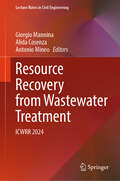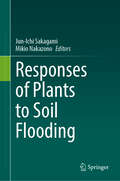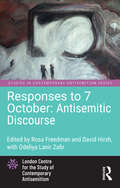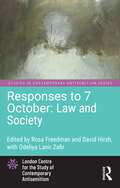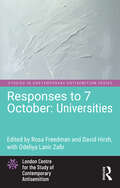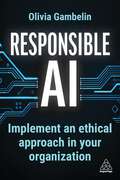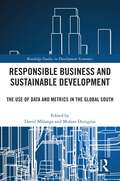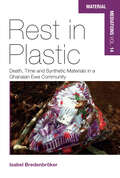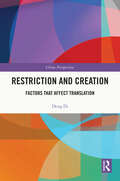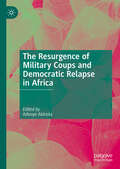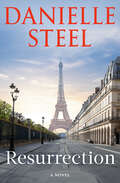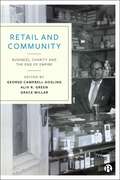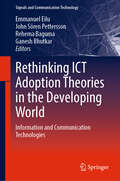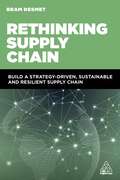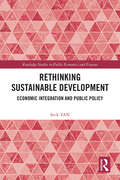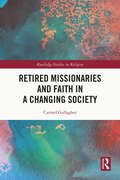- Table View
- List View
Resilient Smart Farming: Crisis-Capable Information and Communication Technologies for Agriculture (Technology, Peace and Security I Technologie, Frieden und Sicherheit)
by Franz KuntkeLike many sectors, agriculture is experiencing a continuous digitalization, i.e. an increase in data-driven technologies used. In contrast to companies of other critical infrastructures, a typical farm is comparatively small and often runs as a family business. Accordingly, the demands on farming technology, its implementation, and regulations are different in many terms. Currently, a promising technological trend of agriculture is smart farming, that incorporates more precise cultivation with less manual effort. But such new developments usually lack an assessment about its impact on the sector's resilience and dependencies on other infrastructures. It remains unclear, how digitalization impacts the resilience of food production and food safety. Therefore, it is not well researched which technological developments may lead to undesired effects in the future. How modern systems should be designed to allow for both, positive impacts on efficiency, and prevention of negative effects interms of reduced resilience capacities, is also not answered by current literature. The aim of the work is to close this research gap in the interplay between agriculture, digitalization, and resilience.
Resistance as Negotiation: Making States and Tribes in the Margins of Modern India (South Asia in Motion)
by Uday Chandra"Tribes" appear worldwide today as vestiges of a pre-modern past at odds with the workings of modern states. Acts of resistance and rebellion by groups designated as "tribal" have fascinated as well as perplexed administrators and scholars in South Asia and beyond. Tribal resistance and rebellion are held to be tragic yet heroic political acts by "subaltern" groups confronting omnipotent states. By contrast, this book draws on fifteen years of archival and ethnographic research to argue that statemaking is intertwined inextricably with the politics of tribal resistance in the margins of modern India. Uday Chandra demonstrates how the modern Indian state and its tribal or adivasi subjects have made and remade each other throughout the colonial and postcolonial eras, historical processes of modern statemaking shaping and being shaped by myriad forms of resistance by tribal subjects. Accordingly, tribal resistance, whether peaceful or violent, is better understood vis-à-vis negotiations with the modern state, rather than its negation, over the past two centuries. How certain people and places came to be seen as "tribal" in modern India is, therefore, tied intimately to how "tribal" subjects remade their customs and community in the course of negotiations with colonial and postcolonial states. Ultimately, the empirical material unearthed in this book requires rethinking and rewriting the political history of modern India from its "tribal" margins.
Resistance Money: A Philosophical Case for Bitcoin
by Andrew M. Bailey Bradley Rettler Craig WarmkeBitcoin isn’t just for criminals, speculators, or wealthy Silicon Valley entrepreneurs – despite what the headlines say. In an imperfect world of rampant inflation, creeping authoritarianism, surveillance, censorship, and financial exclusion, bitcoin empowers individuals to elude the expanding reach and tightening grip of institutions both public and private. So although bitcoin is money, it isn’t just money. Bitcoin is resistance money.Resistance Money: A Philosophical Case for Bitcoin begins by explaining why bitcoin was invented, how it works, and where it fits among other kinds of money. The authors then offer a framework for evaluating bitcoin from a global perspective and use it to examine bitcoin’s monetary policy, censorship-resistance, privacy, inclusion, and energy use. The book develops a comprehensive and measured case that bitcoin is a net benefit to the world, despite its imperfections. Resistance Money is intended for all, from the clueless to the specialist, from the proponent to the die-hard skeptic, and everyone in between.Key Features: Provides a philosophical approach that makes use of multiple disciplines in its analysis Offers a clearly written, measured academic treatment of bitcoin, comprehensive in scope and free of ideological baggage Includes information on the financial, social, and environmental costs of bitcoin, how these costs are sometimes exaggerated, and how they might be mitigated Addresses the strongest arguments against bitcoin and shows how some succeed and most come up short.
Resisting the Dehumanization of Refugees
by Reza Hasmath Yasmeen Abu-Laban Anna Kirova Michael FrishkopfRefugees face distinct challenges and are often subject to dehumanization by politicians, media, and the public. In this context, Resisting the Dehumanization of Refugees provides urgent insights and policy relevant perspectives to improve refugees’ social well-being and integration. Taking a transdisciplinary approach, scholars from the social sciences, arts, and humanities, alongside practitioners and refugees, explore what it means to experience dehumanization. They consider how refugees’ experiences of dehumanization inform both epistemological and practical approaches to humanizing (or re-humanizing) refugees before, during, and after resettlement. By addressing these important issues, contributors marshall rich and multidimensional responses that draw upon our shared humanity and reveal new possibilities for change.
Resolving Disagreements: A Semantic and Epistemological Inquiry (Palgrave Frontiers in Philosophy of Religion)
by Åke WahlbergThis book examines how the semantics and metaphysics of disagreement affect the epistemology of disagreement. It thus broadens the philosophical discourse by relating the epistemological discussion of (peer) disagreement to inquiries into the nature of disagreement and disagreeing. By doing this, it paints a new picture of the epistemological situation evoked by disagreement: To the same extent that an interpersonal dispute undermines the justification of the disputing persons’ beliefs, it also presents an obstacle to interpersonal understanding. This follows from the nature of meaning, belief and communication, rightly understood. In demonstrating the relevance of this to philosophical reflections on peer disagreement and resolution of disagreement, the book addresses arguably the most contentious kind of disagreement, namely, religious disagreement. It shows that apparent disagreement in religion suggests that the dialog partners might not have reached sufficient mutual understanding. This has important ramifications for the rationally right conduct in the face of religious disagreement, and for the possibility of rational resolution of religious disputes.
Resolving the Climate Crisis: US Social Scientists Speak Out (Routledge Advances in Climate Change Research)
by Kristin Haltinner Dilshani SarathchandraThis book brings together a team of renowned social scientists to ask not why climate change is happening, but how we might learn from its human dimensions to raise public and political will to fight against the climate crisis.Despite efforts for mitigation, global emission levels continue to increase annually and the world’s wealthiest nations, including all of the G20 countries, have failed to meet their Paris Climate Goals. In the absence of political will, many have called for individuals to act on climate change by mitigating their own carbon footprint through having fewer children, driving less, using LED lightbulbs, or by becoming vegetarians. While compelling, individual lifestyle changes on this scale are unlikely to prevent climate disaster. Resolving the Climate Crisis presents informed solutions for social change that center human behavior and emotions, political systems, and societal structures. Across a series of concise and accessible chapters, authors explore potential solutions to climate change, addressing topics including Indigenous ecologies, LGBTQ+ community engagement, renewable energy technologies, and climate justice. Their expert engagement with the social and behavioural sciences makes this book not only an essential handbook of climate change solutions but also an innovative model for public-facing social science scholarship.Resolving the Climate Crisis will be an essential resource for students and researchers of climate change, as well as policy makers working to develop meaningful strategies for combatting the climate crisis.
Resource Recovery from Wastewater Treatment: ICWRR 2024 (Lecture Notes in Civil Engineering #524)
by Giorgio Mannina Antonio Mineo Alida CosenzaThis volume highlights the latest advances, innovations, and applications in the field of water resource recovery from water treatment as presented by leading researchers at the International Conference on Wider-Uptake of Water Resource Recovery from Wastewater Treatment (ICWRR), held in Palermo, Italy on June 18-21, 2024. The event took place together with the 7th IWA Regional Membrane Technology Conference (IWA-RMTC). The contributions cover a wide range of themes from innovative and nature-based solutions for water and wastewater management to circularity assessment tools and environmental policy and legislation. The topics include resource recovery from wastewater, wastewater treatment, membrane bioreactors, greenhouse gases from wastewater treatment, LCA, water reuse & rainwater harvesting, mathematical modelling of wastewater treatment plants, metagenomics analysis and environmental microbiology, environmental policy and legislation in the water sector, plant-water-soil nexus, fertilizers from wastewater. The contributions were selected by means of a rigorous peer-review process and highlight many exciting ideas that will spur novel research directions and foster multidisciplinary collaboration among different water specialists.
Responses of Plants to Soil Flooding
by Jun-Ichi Sakagami Mikio NakazonoIn this book, leading researchers from this field systematically explain the latest research results on anaerobic responses in plants. The book is characterized by its in-depth coverage of the tolerance functions of plants under hypoxic conditions from a variety of perspectives, with a particular focus on research areas related to molecular biology and genetics. Although drought responses have dominated water stress research in the past, recent floods and attempts to introduce new cropping systems have made it necessary to take measures against excessive water stress injury, and systematic research is needed for this purpose. From this point of view, the approach taken in this book is new and interesting in that it covers basic research and adaptation technologies in the field, and can be applied to various different situations. The focus of this book is how plants can adapt to poor environments and improve productivity under the conditions of soil hypoxia caused by excess water, such as heavy rains and typhoons. From this point of view, the reader will be able to understand the various adaptations of plants to climate change, which will clarify the future directions of research and show the possibility of applying the knowledge and techniques gained in this book to the field.The Sixth Report of the Intergovernmental Panel on Climate Change (2021) warns that global warming will proceed faster than previously assumed and that all regions of the world will face increasing changes. “Climate Resilient Development” has been proposed as a key phrase to combat global warming, and it is important to identify the adaptive capacity of plants and improve it where possible. In this regard, the publication of this book, which includes ideas for mitigating flood damage caused by global warming, is extremely important, timely, and rational.
Responses to 7 October: Antisemitic Discourse (Studies in Contemporary Antisemitism)
by David Hirsh Rosa Freedman Odeliya Lanir ZafirOne of three volumes responding to the 7 October attack, Antisemitic Discourse focuses on the ideology that motivated it and the antisemitism that shaped many responses to it.It examines the provenance of the Jew-hatred, from English history to Palestinian Islamism; from toxic 19th century ‘Jewish Question’ rhetoric to the perversion of the Trotskyist tradition that allowed parts of the left to embrace antisemitism. It includes Howard Jacobson’s lecture of 22 October on antisemitism and it focuses on what was significant about this attack. There is discussion from Britain, Germany, Poland, and Norway, and a linguistic account of responses.This work will appeal to scholars, students and activists with an interest in antisemitism, Jewish studies and the politics of Israel.
Responses to 7 October: Law and Society (Studies in Contemporary Antisemitism)
by David Hirsh Rosa Freedman Odeliya Lanir ZafirOne of three volumes responding to the 7 October attack, Law and Society begins with a legal and a genocide studies critique of the claim that Israel is genocidal; another reflects on the absence of an understanding of antisemitism in international legal discourse.There are reflections on experiences in the Palestine solidarity movement and on the twists that discourse there takes. Contributions draw on Judaism, feminism, and sociology to face what happened and to trace how Israelis were transported back to a quintessentially pre-Israel Jewish experience. Others survey reports of antisemitism around the globe in the wake of 7 October, including pieces about Britain and Germany.This work will appeal to scholars, students, and activists with an interest in antisemitism, Jewish studies, and the politics of Israel.
Responses to 7 October: Universities (Studies in Contemporary Antisemitism)
by David Hirsh Rosa Freedman Odeliya Lanir ZafirOne of three volumes responding to the 7 October attack, Universities focuses on the heartland of contemporary antisemitic thinking, which is scholarship; and its reflection in student discourse on campus.Contributions go back to Sartre and to debates of Marx’s time; another looks at the New Left forged in the civil rights movement, and shows how antisemitic responses to the 2023 violence were anticipated by some of the responses to the 1967 Arab League aggression. The feminist movement and ‘progressives’ more generally come under scrutiny, and there is analysis of antisemitism on campus after 7 October, showing how it is tolerated and protected there; including in archaeological attempts to deny that there is an ancient Jewish history in Israel.This work will appeal to scholars, students and activists with an interest in antisemitism, Jewish studies and the politics of Israel.
Responsible AI: Implement an Ethical Approach in your Organization
by Olivia GambelinResponsible AI is a guide to how business leaders can develop and implement a robust and responsible AI strategy for their organizations.Responsible AI has rapidly transitioned to a strategic priority for leaders and organizations worldwide. Responsible AI guides readers step-by-step through the process of establishing robust yet manageable ethical AI initiatives for any size organization, outlining the three core pillars of building a responsible AI strategy: people, process and technology. It provides the insight and guidance needed to help leaders fully understand the technical and commercial potential of ethics in AI while also covering the operations and strategy needed to support implementation.Responsible AI breaks down what it means to use ethics and values as a modern-day decision-making tool in the design and development of AI. It conceptually covers both how ethics can be used to identify risks and establish safeguards in the development of AI and how to use ethics-by-design methods to stimulate AI innovation. It also covers the different considerations for large enterprises and SMEs and discusses the role of the AI ethicist. It is supported by practical case studies from organizations such as IKEA, Nvidia, Rolls-Royce and NatWest Group.
Responsible Business and Sustainable Development: The Use of Data and Metrics in the Global South (Routledge Studies in Development Economics)
by David Mhlanga Mufaro DzingiraiResponsible and sustainable business practices are becoming increasingly important in the information age, as companies are realizing the need to address ethical and social issues associated with their operations. In today’s interconnected world, businesses have access to vast amounts of data that can be used to improve their bottom line but can also pose significant risks to individuals and society. At the same time, responsible business practices have the capacity to positively impact international development goals such as poverty alleviation, economic growth, responsible consumption, and health and social welfare.This book presents a transdisciplinary framework for addressing the 2030 Sustainable Development Agenda, offering fresh perspectives from the Global South. It provides an overview of the key challenges and opportunities associated with responsible business practices in the information age, including the need to balance privacy and security concerns with data analytics and innovation. It also highlights some of the best practices and initiatives, such as stakeholder engagement, transparency, and accountability. The book establishes the role of green leadership in promoting responsible production, discusses the importance of measuring and reporting on sustainable innovation, including the use of sustainability metrics and reporting frameworks. Further, it debates the importance of incorporating ethics and sustainability in strategic management practices. It provides a comprehensive understanding of the integration of these values in organizational decision‑making. By delving into the pressing matters that impact our world today, the book generates a sense of urgency and awareness among its audience.Its inclusive approach to exploring various perspectives and opinions invites readers to participate in a constructive dialogue, broadening their understanding and deepening their empathy for different viewpoints.
Rest in Plastic: Death, Time and Synthetic Materials in a Ghanaian Ewe Community (Material Mediations: People and Things in a World of Movement #14)
by Isabel BredenbrökerIn Peki, an Ewe town in the Ghanaian Volta Region, death is a matter of public concern. By means of funeral banners printed with synthetic ink on PVC, public lyings in state, cemented graves and wreaths made from plastic, death occupies a prominent place in the world of the living. Rest in Plastic gives an insight into local entanglements of death, synthetic materials and power in Ewe community. It shows how different materials and things that come to shape power relations, exist in a delicate balance between state and local governance, kin and outsiders, death and life, the invisible and the visible, movement and containment.
Restriction and Creation: Factors That Affect Translation (ISSN)
by Deng DiThis book presents an overall picture of the constraints faced at different stages of the translation process, providing a more scientific approach to descriptive translation studies.The study investigates translation constraints at three different levels. The micro-system includes the original work, the translator, and the translation itself. The meso-system includes various factors that represent power, such as individuals, groups, and institutions. The book also examines the macro-system, which includes factors related to culture, society, and even the global context. Drawing on the principles of literary hermeneutics, this book advances the study of translation constraints from description to interpretation through systematic analysis. Incorporating the latest scholarship from both national and international sources, the book discusses translation studies when it explores translation constraints and analyses translation constraints when it discusses translation studies.The book will be of interest to scholars and students of translation theory and practice and Chinese studies. It will also be of value to translation professionals.
The Resurgence of Military Coups and Democratic Relapse in Africa
by Adeoye AkinolaThis book presents the reality of democratic reversals and waves of coups cutting throughAfrica, explores the political economy of coups, and through a case studyapproach, provides a nuanced analysis of the negative impacts of coups inAfrica, and interrogates the roles of African regional organisations incurtailing coups and foreign powers in distorting the security architecture ofAfrican states, particularly in the Sahel region. It proffers sustainablepolicy templates for political development, professionalism of the military,and the subsequent withdrawal of the military from African politics. Apart fromits policy relevance, it will serve as a resource pool for researchers workingin the area of African political development, peace and security, and securitysector reforms. With the incremental exit of France from the Sahel, the bookwill also offer a nuanced perspective on the ‘scramble for the soul’ of theSahel by non-Western powers, such as China, Russia, Turkey, and Saudi Arabia.
Resurrection: A Novel
by Danielle Steel#1 New York Times bestselling author Danielle Steel returns with an irresistible novel about a woman whose seemingly perfect life comes crashing down—and learns to find joy in rising above.Darcy Gray is a successful influencer with her blog, The Gray Zone, trusted by more than a million followers for her integrity and taste. At forty-two, she has the life she wants in many ways. Darcy and her husband, department store magnate Charles Gray, are a power couple in Manhattan and on the international stage. Their beloved twin daughters are each enjoying their junior year abroad, Penny in Hong Kong and Zoe at the Sorbonne in Paris.To celebrate twenty years of marriage, Darcy impulsively flies to Rome to surprise Charlie, who is tending to business interests there. Instead, she gets the shock of her life, which upends her whole world.Still reeling, Darcy flees to Paris to see Zoe. But a rapidly escalating worldwide health crisis forces her to remain indefinitely in France. Suddenly thrust into a gray zone of her own, her forced separation from Zoe and the rest of her family feels like too much to bear . . .Until Darcy finds a welcoming refuge in the home of the aging French movie star Sybille Carton. There, she meets a widowed American engineer and former Marine who is also stranded. Bill Thompson is kind and courteous but also carries an air of mystery about him. In this shared confinement, and despite worries about her girls, Darcy begins to see glimpses of new possibilities.In Resurrection, Danielle Steel poignantly shows how the hardest of times can give birth to a beautiful new life.
Retail and Community: Business, Charity and the End of Empire
by Harshad Keval Ian Mitchell Jenny Gilbert Nadia Awal Jessica Field Triona Fitton Majorie Gehrhardt Nick Gray Ruth MacDonald Massimiliano PapiniRetail has never existed in a vacuum. This interdisciplinary volume explores how English commercial, co-operative and charity retailing were shaped by and in turn influenced their social and political environments, from the local to the global, between the late nineteenth and early twenty-first centuries. Historians, sociologists, archivists and heritage professionals engage with current debates on the rise of modern business and the decline of the high street, class and credit, professionalisation in the voluntary sector, migration and the end of empire.This book will be a key resource to better understand retail and community in an era defined by social change, shedding new light on the enduring centrality of community relationships to modern retailers.
Rethinking ICT Adoption Theories in the Developing World: Information and Communication Technologies (Signals and Communication Technology)
by Emmanuel Eilu Ganesh Bhutkar Rehema Baguma John Sören PetterssonThis book provides extended frameworks and models to help with the adoption of information and communication technologies (ICT) in developing countries. The book first discusses the extent to which conventional ICT theories can be rigid in nature, often unable to handle the constant advances in technology, and technology adoption, implementation, usage, and disposal, not to mention different needs and cost availability in developing countries. The authors go on to show how new and revised models, tested in many societies in developing countries, can solve this mismatch. The authors provide examples of successful ICT adoption in developing country settings, in the areas of agriculture, culture, forestry, education, economics, health, and governance. The authors also show how techniques from persuasive design, philosophical designs, and motivational designs have been adjusted to facilitate successful ICT adoption, implementation, usage, and disposal in targeted regions.
Rethinking Supply Chain: Build a Strategy-Driven, Sustainable and Resilient Supply Chain
by Dr Bram DeSmetRethinking Supply Chain outlines how organizations can close the gap between the supply chain capabilities they have and the supply chain capabilities they want.The supply chains built pre-covid are no longer suitable in the current volatile business environment. Rethinking Supply Chain explores why and how organizations can upgrade their supply chains to level 5 maturity, enhancing them to be more sustainable, strategy-driven and resilient. It outlines the dangers of using outdated supply chain practices, sharing what goes wrong when organizations run level 5 complexity and variability with a level 1 capability. It shows how organizations can improve their strategic planning, supply chain design, sales and operations planning and business planning processes to respond to new dynamic levels of variability and complexity. It is supported by practical frameworks and roadmaps. This book outlines why supply chain reconfiguration is needed, how to define a business case for change and the steps needed to drive effective transformation. Rethinking Supply Chain also explores how to integrate sustainability into the heart of supply chain design and operations and examines the trade-offs organizations must navigate, depending on whether they wish to be at par, differentiate or dominate on sustainability drivers.
Rethinking Sustainable Development: Economic Integration and Public Policy (Routledge Studies in Public Economics and Finance)
by Seck TANThis book demonstrates falsified economic performance of global economies when the environment is not recognised as a capital, and when the ecosystem is overlooked towards sustainable development.Seck begins with an analysis of standard macroeconomic framework and policy practice. He argues, with reference to environmental accounting literature, that environmental capital must form an integral component of economic measurement. This paves the way for an alternative environmental-macroeconomics framework for policy analysis that promotes sustainable development. The book demonstrates how environmental capital can be measured with reference to select OECD countries and provides a methodology for analysing how macroeconomic goals are related to a steady-state economy. Seck then concludes with a summary of the conflict between current economic growth and ecosystem preservation, and outlines possible policy improvements and directions for research.Rethinking Sustainable Development is an invaluable reference for policymakers as well as researchers and students of environmental economics, sustainable development, and macroeconomics.
Rethinking the Red Power Movement (American Social and Political Movements of the 20th Century)
by Sam Hitchmough Kyle T. MaysRethinking the Red Power Movement examines Red Power ideology with a focus on its many forms of solidarity with African Americans, the role of gender in shaping the movement, its international expansion, and its current meaning in contemporary activism.The Red Power Movement is often considered the apex of Indigenous activism in the twentieth century. While diverse, the movement is typically told through four actions. Beginning with the occupation of Alcatraz in 1969, followed by the Trail of Broken Treaties in 1972, Wounded Knee in 1973, then culminating with the Longest Walk in 1978, there is a clear jumpstart, middle, and end to the Red Power Movement. Through a chronological approach, this study makes the case that Red Power never died—and neither did Indigenous activism. Instead, it shows how Indigenous peoples found many ways to push forward Indigenous sovereignty and continue to call on the United States to value Indigenous possibilities for justice, freedom, and power.This book is useful for students and scholars interested in twentieth century America, social movements, and the history of Indigenous activism.
Rethinking Weapon Play in Early Childhood: How to Encourage Imagination, Kindness, and Consent in Your Classroom
by Samuel Broaden Kisa MarxThis thought-provoking read invites you to reconsider your automatic "no" when it comes to young children’s weapon play. It offers new perspectives on how weapon play and other risky or controversial play can provide opportunities for healing discussions—including around boundaries, kindness, and consent—and create positive learning experiences for children and teachers alike. Centered in an antiracist framework with applications across diverse communities, the book is written by two educators with unique lived experiences of community violence and safety who each share their perspectives on risky play, questions to consider, and strategies to try in the classroom. Aiming to inspire new ways of thinking, instead of trying to change your mind outright, this book asks deep questions to support you in carefully thinking about the kind of play allowed in your classroom. This book is an essential resource for early years teachers, practitioners, and anyone with a key interest in creating supportive spaces for young children.
Rethinking Writing Instruction In The Age Of Ai: A Universal Design For Learning Approach
by Randy LaistWriting is an invaluable academic skill, but, as writing expert Randy Laist points out, "it is also much more than that. It is a tool for thinking, a means of personal expression, and a vehicle of self-discovery." Composition instructors have long been challenged to fi nd effective ways of engaging and empowering student writers. In the age of Artificial Intelligence (AI), this challenge has become even more complicated, with too many students-and too many people in general-feeling shut out of writing. In Rethinking Writing Instruction in the Age of AI, Laist offers composition instructors practical ways to address AI panic as well as insight into how to embrace it as an opportunity to strengthen writing and critical thinking skills. Further, Laist shows how Universal Design for Learning provides a framework that can help unpack the writing process and support instruction. This book offers numerous hands-on writing activities that are not only engaging but also "AI proof."
Retired Missionaries and Faith in a Changing Society (Routledge Studies in Religion)
by Carmel GallagherRetired Missionaries and Faith in a Changing Society offers a sociological study of the Irish missionary diaspora. It draws on a series of interviews with female and male Catholic missionaries, mainly nuns and priests, who have worked in Asia, Africa and Central and South America, and who have returned to live in Ireland. The chapters provide unique insight into their experiences, exploring how they have navigated life-course changes in the context of changing church and changing societies. Retired missionaries have several vantage points from which to communicate their understandings, having worked across cultures and encountered some of the most challenging global social problems. Responding to significant changes in the Catholic Church, in Irish society, in their host countries and in mission work itself, their lives offer valuable perspectives on what it is to be Christian in contemporary society. The rich narrative data illuminates deep and complex processes of meaning-making as missionaries have sought to integrate their religion and spirituality in dynamic and diverse settings. The book suggests that the holistic character of the work of missionaries raises important questions about the different ways of being ethical, religious and acting justly in the world today. It will be of particular interest to scholars of Christianity, missiology, and the sociology of religion.
